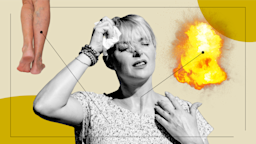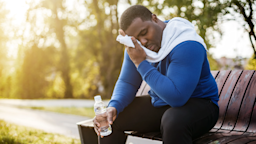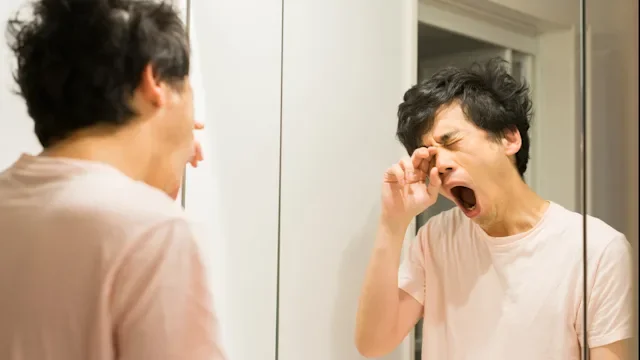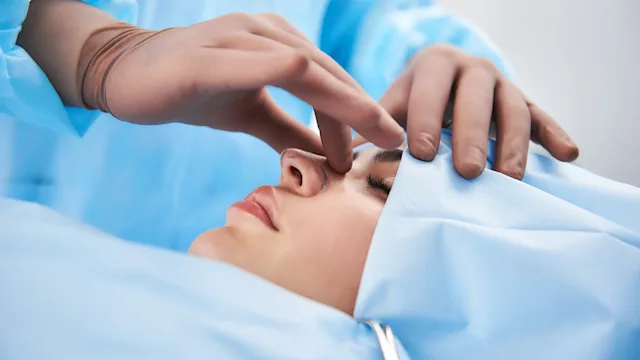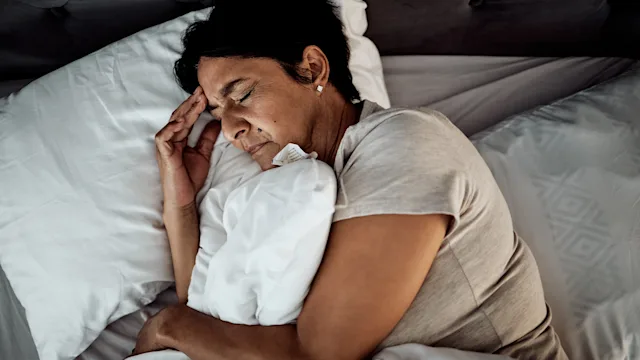Key takeaways:
Night sweats are very common, but they can be quite disruptive when severe. Fortunately, there are ways you can stop them once you find the cause.
While night sweats can be harmless, they can also be a sign of an underlying medical condition.
To stop your night sweats, your provider will develop a plan that may include lifestyle changes or medication.
Sweating is normal. It’s the body’s natural cooling mechanism. Sweating a little at night can also be normal. But it’s a different story if you sweat so much you have to change the sheets or your pajamas. These are called “night sweats.”
Night sweats are very common — affecting up to 40% of the population at any given time. Anyone can experience night sweats, and they’re more common with age. There are many possible causes, from benign (not harmful) conditions to more serious disorders.
Night sweats are bothersome to both the person experiencing them and anyone they share a bed with. They can also lead to daytime tiredness and sleep problems. Fortunately, you don’t just have to suffer through them. It’s important to understand why they’re happening and to discuss the symptoms with your healthcare provider. They can develop a plan of action to stop your night sweats.
Search and compare options
What are night sweats?
Night sweats are recurrent drenching sweats during sleep. Depending on the severity, the sweats may wake you up or interrupt your sleep. They may even drench you to the point you have to get up and wash yourself. In some cases, it can be serious enough to require a nightly change of your bedding and the clothes you wore to sleep.
There’s a complex relationship between sweating and the way your body controls temperature. It’s known as the “thermoregulatory system.” The hypothalamus, a part of the brain, manages it. When you experience night sweats, it’s because your internal body temperature has gone up.
As a result of this rise, your body will naturally try to drop your body temperature. This response includes many signs, such as:
Increase in heart rate
Widening of blood vessels in the skin, which makes you look flushed
Sweat production, after the hypothalamus sends a chemical signal to the sweat glands
Evaporation of the sweat on the skin, which cools off your body
If the sweating is enough to wake you up, you may still feel overheated. Or you could be shivering as your body temperature drops appropriately.
What causes night sweats?
Menopause is often the main condition that comes to mind when people think about night sweats. While hormonal changes are a common reason, night sweats affect those who have had monthly periods and those who have not. There are many other possible causes. These include both medical and environmental conditions.
Infections
Most infections can cause nighttime fevers with some associated sweating. Certain infections will cause repeated, drenching night sweats. These can include infections such as:
Tuberculosis (TB)
Osteomyelitis (within the bone)
Abscess (collection of pus in the body tissues)
Fungal infections
Read more like this
Explore these related articles, suggested for readers like you.
Sleep disorders
Night sweats seem to be linked to several sleep disorders. While experts aren’t exactly sure how, some sleep disorders may cause night sweats. This link has been seen most often with obstructive sleep apnea. And it may also be linked to restless leg syndrome.
Hormonal conditions
Hormonal conditions, or endocrine disorders, can occur if your body makes too much or too little of a hormone. This hormonal imbalance can lead to night sweats. Common endocrine conditions that may cause night sweats include:
Hyperthyroidism (too much thyroid hormone)
Hypogonadism (a low testosterone level)
Hypoglycemia (low blood sugar)
Pheochromocytoma (a tumor causing too much adrenal gland hormone)
Carcinoid tumor (a tumor causing too much serotonin)
It’s also common to have night sweats during pregnancy. This is likely due to the hormonal changes that normally occur with pregnancy.
Mental health disorders
While anxiety and stress are mental health issues, they often cause physical responses. When your body perceives stress, there can be hormone surges that contribute to night sweats. Mental health conditions that have been linked to night sweats include:
PTSD (post-traumatic stress disorder)
Cancer
You may experience night sweats if you have cancer or are getting treatment for cancer. The night sweats associated with cancer tend to occur daily. And there are often other symptoms, such as daytime fevers or unexplained weight loss.
While various types of cancers can cause night sweats, the ones most likely to do so include:
Leukemia (cancer of the blood)
Lymphoma (cancer of the lymphatic/infection-fighting system)
Liver cancer
Mesothelioma (cancer of the lining of the lungs, abdomen, or heart)
Bone cancer
Menopause
Hot flashes and night sweats are the main symptoms of menopause. Among women going through menopause, 80% will experience these at some point. Experts don’t know exactly why this happens in menopause. But it appears that the drop in hormones changes how the hypothalamus controls your body temperature.
These night sweats can occur on and off for an average of 7 years. Factors that make the night sweats more severe or last longer include:
African descendancy
Early-onset menopause (age less than 50)
Heavier body weight
History of anxiety or depression
Smoking or tobacco use
Lack of exercise
Substance use and abuse
Alcohol use can affect your heart rate and dilate your blood vessels. This affects your blood pressure, circulation, and body temperature — all of which can lead to sweating. You can have a strong reaction to alcohol and experience night sweats after just 1 drink. But most people can experience sweats if they have more than 4 or 5 drinks in a short period of time.
If you drink alcohol heavily on a regular basis, night sweats can occur when you don’t drink it. This is due to alcohol withdrawal.
Similar to the effects of alcohol, many addictive substances can also alter your body temperature. This can happen when you use the substance or during withdrawal. This is common with substances like:
Cocaine
Heroin
Methamphetamine
Medications
Both prescription and over-the-counter (OTC) medications can lead to night sweats. While many medications can cause sweats, the ones most commonly associated with this side effect are:
Antidepressants (like SSRIs, bupropion, and amitriptyline)
Hormone therapy (like leuprolide, anastrozole, and Tamoxifen)
Movement disorder treatment (like ropinirole)
Prescription pain relievers (like oxycodone, tramadol, and fentanyl)
Migraine medications (like triptans)
How do you diagnose night sweats?
If you’re concerned about night sweats, the first step is to contact your healthcare provider. They can help you figure out why the sweats are occurring and treat the underlying issue. Your provider will ask a lot of questions about your medical history and do a physical exam.
Depending on what they find, you may need further testing. This might include blood work, a skin test for tuberculosis, or imaging studies like a chest X-ray or CT scan.
Sometimes your healthcare provider can’t find a reason why you’re sweating. Or it may be due to a condition you can’t change. In these cases, there are treatment options to help you stop sweating at night.
How can you stop night sweats?
Treatment for night sweats will vary from person to person. It will also depend on the reason for your sweating. But there are some steps that most people with night sweats can take to cool off. Here are four common approaches.
1. Sleep environment changes
You can start by making practical changes to your sleeping environment. This may help to minimize how often you get night sweats and how severe they become. You can try the following:
Make your bedroom cooler. If you have a thermostat, set it to a lower temperature to keep heat from building up around your body during the night. The recommended range is between 65°F to 70°F.
Place a fan near your bed. It may help if you turn it on before you fall asleep. Or you can have it nearby if you want to turn it on when you wake up overheated.
Place a cool pack under your pillow before you fall asleep. You can turn the pillow over if you wake up sweaty at night. The cool underside will make it easier to fall back to sleep.
Invest in new bedding, if possible. Certain fabrics and materials can help wick away moisture and prevent the buildup of heat. Choose lightweight, loose-fitting sleep clothes made of cotton or bamboo. Avoid excess blankets.
2. Lifestyle changes
Lifestyle changes can go a long way to keeping you cool at night:
Watch your diet. Avoid or limit caffeine, alcohol, and spicy foods. These can cause spikes in body temperature.
Avoid hot beverages at night. If you’re thirsty, drink cool water before going to bed. This can help to lower your core body temperature.
Make exercise a priority. There seems to be a direct correlation between weight gain and the intensity of night sweats. Regular aerobic exercise can help you maintain a healthy weight. There’s also the bonus of reducing stress levels.
3. Behavioral therapy
Stress and anxiety can trigger night sweats. Behavioral therapy can help manage these conditions. Cognitive behavioral therapy (CBT) may help reduce night sweat frequency and improve mood and quality of life.
Relaxation techniques — such as guided meditation or controlled breathing — can also help to decrease stress and anxiety.
4. Medications
Treatment usually targets the underlying cause. In menopause, for example, hormone replacement therapy can help reduce moderate to severe night sweats.
There are also hormone-free therapies. While not all of them are FDA approved for the treatment of night sweats, researchers have studied them in people with sweats. These include:
Antidepressants (like paroxetine and venlafaxine)
Anti-seizure medication (like gabapentin)
Blood pressure medication (like clonidine)
Based on your medical history, your provider can figure out if you need medication to help control your night sweats.
The bottom line
Sweating is an expected body function that helps cool you down when you’re exercising or in a hot environment. But sweating can be disruptive when you’re trying to get a good night’s sleep.
If you have to change your bedding at night due to sweat, you’re not alone. Night sweats are common, but you shouldn’t ignore them. If your night sweats are preventing you from getting quality sleep, talk to your healthcare provider to find the cause and ways to stop them.

Why trust our experts?


References
American Academy of Dermatology Association. (2019). Research suggests connection between excessive sweating and mental health conditions.
Ayers, B., et al. (2012). Effectiveness of group and self-help cognitive behavior therapy in reducing problematic menopausal hot flushes and night sweats (MENOS 2): A randomized controlled trial. Menopause.
Bansal, R., et al. (2019). Menopausal hot flashes: A concise review. Journal of Mid-Life Health.
JAMA Network. (2015). Hot flashes, night sweats last for 7+ years in many midlife women.
MedlinePlus. (2021). Hypothalamus.
Mold, J. W., et al. (2006). Associations between night sweats and other sleep disturbances: An OKPRN study. Annals of Family Medicine.
Mold, J. W., et al. (2012). Night sweats: A systematic review of the literature. Journal of the American Board of Family Medicine.
Mold, J. W., et al. (2004). Prevalence and predictors of night sweats, day sweats, and hot flashes in older primary care patients: An OKPRN study. Annals of Family Medicine.
National Cancer Institute. (2021). Hot flashes and night sweats (PDQ®)–patient version.
National Institute on Alcohol Abuse and Alcoholism. (n.d.). Alcohol’s effects on the body.
Raj, A. (2020). 1214 higher bedroom temperatures associated with poorer sleep: Data from over 3.75 million nights. Sleep.
The North American Menopause Society. (2017). Obesity can lead to more severe hot flashes and other menopause symptoms. ScienceDaily.
Thurston, R. C., et al. (2012). Vasomotor symptoms and menopause: Findings from the study of women’s health across the naiton. Obstetrics and Gynecology Clinics of North America.


